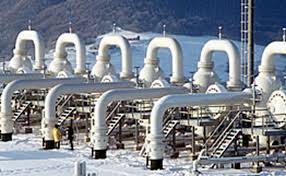Washington’s interest in Greece and the country’s debt issue was demonstrated yet again during the latest round of negotiations when Treasury Secretary Jacob Lew stepped in to urge all parties involved to find a solution. The US politician’s move immediately sparked questions as to whether economic criteria and American concern over the wider impact on the global economy of a Greek debt-related mishap was the sole factor at play.
Some degree of clarity was gained just days ago during a telephone conversation between Greek Foreign Minister Nikos Kotzias and his US counterpart John Kerry, their first form of contact since leftist Syriza’s recent election victory in Greece. During the call, Washington’s interests in energy matters for the wider region were made clear. According to an official announcement released by the State Department following the call, “the importance of energy diversification for Greece’s long-term economic strength” was underlined.
Analysts have already noted that the US’s interest in Greece carries greater geopolitical weight, with energy being a key factor, than purely economic concerns. The fact that Kerry raised the issue of energy in his first discussion with the Greek foreign minister is indicative.
The telephone conversation between the two officials was preceded by a meeting in Baku between Production Reconstruction, Environment and Energy Minister Panayiotis Lafazanis and Amos Hochstein, the US Department of State’s Acting Special Envoy and Coordinator for International Energy Affairs. The officials discussed the Southern Corridor, whose overall aim is to supply natural gas from the Caspian and Middle Eastern regions to Europe through various projects. These include TAP, to carry Azeri gas into Europe via Greece.
Kotzias, the Greek Foreign Minister, who recently also met with his Russian counterpart Sergey Lavrov in Moscow, noted that Athens was observing, with an interest, Russia’s Turkish Stream, a pipeline plan that would transmit Russian natural gas to the Greek-Turkish border for eventual supply deeper into European territory.
Analysts consider that Turkish Stream, if developed, would directly compete against the Southern Corridor-TAP plan as the latter will, for the first time, transmit non-Russian gas from the Caspian region to European markets. It is believed that the co-existence of the Southern Corridor-TAP and Turkish Stream projects is not be feasible as the two represent conflicting objectives. The Southern Corridor-TAP plan aims to diversify Europe’s energy sources, limiting the continent’s reliance on Russian gas. On the other hand, Turkish Stream will push to safeguard Russian gas sales in southeast European markets, currently exclusively supplied by Russia.
Certain pundits believe that Russia’s current economic problems – largely driven by the dramatic fall of international crude oil prices, which has severely affected the country’s petrol-exporting sector and budget revenues – make Turkish Stream an unrealistic plan that purely represents a Russian attempt to protect its gas export markets and obstruct the inflow of Azeri natural gas.





